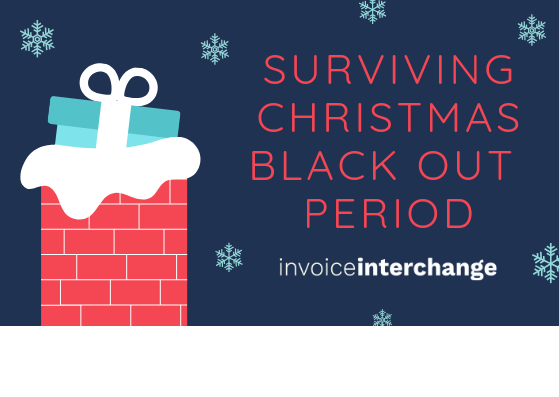Christmas is a merry time of the year, especially if you are an employee. The holidays are filled with Christmas parties, bonuses and days off to spend time with loved ones. Ironically the opposite is true of business owners who face significant stress as they experience working capital shortages in the lead-up to Christmas through the first quarter of the new year. SME’s face a very sensitive financial situation during those months that can lead many companies to fail.
Contrary to popular belief, increases in sales during the holiday period do not directly translate to increases in working capital for business-to-business models. During the Christmas Blackout Period, most companies see their bills stack up while payment inflows become overdue from customers.
Origin of the Christmas Blackout Period:
The source of the cash-flow crisis can be traced to many different factors depending on the type of business and the management style of each business owner. It might be from the business receiving a high volume of sales in the lead-up to Christmas and the owners spending all the money in the bank account; It might also be the result of disappointing Christmas sales or from having to having to fork out holiday and leave pay while less money is flowing in.
The over arching theme is companies restricting cash outflows to preserve cash in order to pay wages. As a result, payment to suppliers take the backseat. Debtors try to use the payment term to its fullest without being penalized with extra late fee. When debtors fail to pay you, you can’t pay your own suppliers who might then implement a credit stop. This turns into a chain of events felt across the industry as a whole not just one sector.
This period can even be a precursor to insolvency and cash shortages. Businesses who managed to survive until February might find themselves on stop credit with suppliers, leaving them with outstanding credit.
Finding solutions that help you prepare for this Christmas blackout period is crucial and sensible decisions now can lead to a cash-flow crisis avoided in the new year. Some strategies include:
1. Budget now
The best foresight is the best hindsight. Budgeting for cash inflows and outflows during Christmas Blackout Period will help you manage any shortfalls. Being aware of when the shortfalls may take place and when your large expenses will occur enables you to estimate how much you need to put aside. When forecasting cash outflows it is better to overestimate than underestimate. This prevents you from being short.
2. Put money aside
It is no good knowing how much you need to put aside if you are not actually doing it. The concept of a savings plan is not only applicable for personal matters but also a must for all businesses. Apply your previous knowledge of crucial outflows and inflows and prepare for cash crunches now is better than having to react to having no cash to pay bills later.
Knowing how much money to set aside and actually transferring it into a separate bank account so it’s not going to be spent, is critical. Make sure you enter the bills into your accounting system so you know how much you have to pay and start putting a percentage of your sales aside so that you can pay the bills when they start rolling in. With the addition of a safety cushion, you can save extra cash to be used to pay bills that are due early.
3. Forecast your cash flow
Understand when you are being paid and how your business functions. If you are a retailer or online store you are usually paid immediately. Therefore, issues are more to do with budgeting and discipline, especially around Christmas Blackout Period. However, if you are selling to businesses then the December to March period can be a difficult time for cash flow. That’s because business owners often have school fees to pay in January or they’ve been on holidays themselves so if you’re not chasing payment in December then you may be waiting until February to receive your money. So be proactive about invoicing and chasing payments. Don’t wait to invoice – invoice quickly and follow up. Phone outstanding debtors now and make sure your invoice isn’t one of those forgotten until well into the new year.
4. Ask for help
Afraid to request for payment extension from your supplier during this period? Don’t be. Your supplier will not be caught off guard if you negotiate longer terms ahead of time. The worst thing you can do is waiting until the last minute making you seem irresponsible. Your creditors will be much happier knowing that you are doing something about their debts rather than ignoring them. This might involve organising an overdraft or setting up payment plans with your creditors. The most important thing is that you ask for help sooner rather than later.
5. Think long term
Dealing with short-term cash-flow issues is important but it’s just as important to consider your long-term strategy. The new year is a great time to revise or create your business strategy and budget. Implement programme to obtain early payments from your customers. Incentivise customers who typically leave invoices outstanding for entire credit period by offering early payment discounts that will motivate them to get the invoices paid early to better help manage your accounts receivable. Also consider things like asking for 50 per cent upfront, shortening payment terms or penalties for late payment.
6. Search for alternative funding solutions
For any situation it is important to have a back-up plan in case you find yourself in need of funds immediately during the festive season, including Christmas Blackout Period. That is why it is important to set-up active accounts with online invoice discounting services, like Invoiceinterchange. This simple and convenient service can provide an alternative financing option to your business by freeing up cash flow in a crucial time like this.
The holiday season should be a time to be jolly not one of stress. Let’s make sure we can keep it stress fear by preparing ahead and ensuring your business has enough money aside for bills so you can relax and enjoy meals with your loved ones and celebrate the new year.
Related Articles
Related Articles

The Working Capital Challenge: How Long Credit Terms Could Be Holding Your Business Back

Understanding the Impact of Chinese New Year on Cash Flow: A Guide for SMEs

